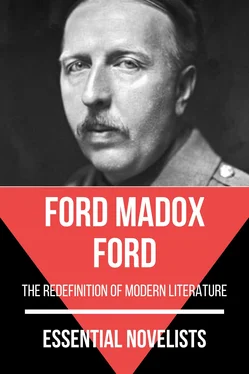I don’t know why they did not take him on the hop; but they have queer sorts of wisdoms, those people, and queer sorts of tact. Perhaps they thought that Edward’s too early conversion would frighten off other Protestant desirables from marrying Catholic girls. Perhaps they saw deeper into Edward than he saw himself and thought that he would make a not very creditable convert. At any rate they — and Leonora — left him very much alone. It mortified him very considerably. He has told me that if Leonora had then taken his aspirations seriously everything would have been different. But I dare say that was nonsense. At any rate, it was over the question of the chapel that they had their first and really disastrous quarrel. Edward at that time was not well; he supposed himself to be overworked with his regimental affairs — he was managing the mess at the time. And Leonora was not well — she was beginning to fear that their union might be sterile. And then her father came over from Glasmoyle to stay with them.
Those were troublesome times in Ireland, I understand. At any rate, Colonel Powys had tenants on the brain — his own tenants having shot at him with shot-guns. And, in conversation with Edward’s land-steward, he got it into his head that Edward managed his estates with a mad generosity towards his tenants. I understand, also, that those years — the ‘nineties — were very bad for farming. Wheat was fetching only a few shillings the hundred; the price of meat was so low that cattle hardly paid for raising; whole English counties were ruined. And Edward allowed his tenants very high rebates.
To do both justice Leonora has since acknowledged that she was in the wrong at that time and that Edward was following out a more far-seeing policy in nursing his really very good tenants over a bad period. It was not as if the whole of his money came from the land; a good deal of it was in rails. But old Colonel Powys had that bee in his bonnet and, if he never directly approached Edward himself on the subject, he preached unceasingly, whenever he had the opportunity, to Leonora. His pet idea was that Edward ought to sack all his own tenants and import a set of farmers from Scotland. That was what they were doing in Essex. He was of opinion that Edward was riding hotfoot to ruin.
That worried Leonora very much — it worried her dreadfully; she lay awake nights; she had an anxious line round her mouth. And that, again, worried Edward. I do not mean to say that Leonora actually spoke to Edward about his tenants — but he got to know that some one, probably her father, had been talking to her about the matter. He got to know it because it was the habit of his steward to look in on them every morning about breakfast-time to report any little happenings. And there was a farmer called Mumford who had only paid half his rent for the last three years. One morning the land-steward reported that Mumford would be unable to pay his rent at all that year. Edward reflected for a moment and then he said something like:
“Oh well, he’s an old fellow and his family have been our tenants for over two hundred years. Let him off altogether.”
And then Leonora — you must remember that she had reason for being very nervous and unhappy at that time — let out a sound that was very like a groan. It startled Edward, who more than suspected what was passing in her mind — it startled him into a state of anger. He said sharply:
“You wouldn’t have me turn out people who’ve been earning money for us for centuries — people to whom we have responsibilities — and let in a pack of Scotch farmers?”
He looked at her, Leonora said, with what was practically a glance of hatred and then, precipitately, he left the breakfast-table. Leonora knew that it probably made it all the worse that he had been betrayed into a manifestation of anger before a third party. It was the first and last time that he ever was betrayed into such a manifestation of anger. The land-steward, a moderate and well-balanced man whose family also had been with the Ashburnhams for over a century, took it upon himself to explain that he considered Edward was pursuing a perfectly proper course with his tenants. He erred perhaps a little on the side of generosity, but hard times were hard times, and every one had to feel the pinch, landlord as well as tenants. The great thing was not to let the land get into a poor state of cultivation. Scotch farmers just skinned your fields and let them go down and down. But Edward had a very good set of tenants who did their best for him and for themselves. These arguments at that time carried very little conviction to Leonora. She was, nevertheless, much concerned by Edward’s outburst of anger. The fact is that Leonora had been practising economies in her department. Two of the under-housemaids had gone and she had not replaced them; she had spent much less that year upon dress. The fare she had provided at the dinners they gave had been much less bountiful and not nearly so costly as had been the case in preceding years, and Edward began to perceive a hardness and determination in his wife’s character. He seemed to see a net closing round him — a net in which they would be forced to live like one of the comparatively poor county families of the neighbourhood. And, in the mysterious way in which two people, living together, get to know each other’s thoughts without a word spoken, he had known, even before his outbreak, that Leonora was worrying about his managing of the estates. This appeared to him to be intolerable. He had, too, a great feeling of self-contempt because he had been betrayed into speaking harshly to Leonora before that land-steward. She imagined that his nerve must be deserting him, and there can have been few men more miserable than Edward was at that period. You see, he was really a very simple soul — very simple. He imagined that no man can satisfactorily accomplish his life’s work without loyal and whole-hearted cooperation of the woman he lives with. And he was beginning to perceive dimly that, whereas his own traditions were entirely collective, his wife was a sheer individualist. His own theory — the feudal theory of an over-lord doing his best by his dependents, the dependents meanwhile doing their best for the over-lord — this theory was entirely foreign to Leonora’s nature. She came of a family of small Irish landlords — that hostile garrison in a plundered country. And she was thinking unceasingly of the children she wished to have. I don’t know why they never had any children — not that I really believe that children would have made any difference. The dissimilarity of Edward and Leonora was too profound. It will give you some idea of the extraordinary naïveté of Edward Ashburnham that, at the time of his marriage and for perhaps a couple of years after, he did not really know how children are produced. Neither did Leonora. I don’t mean to say that this state of things continued, but there it was. I dare say it had a good deal of influence on their mentalities. At any rate, they never had a child. It was the Will of God.
It certainly presented itself to Leonora as being the Will of God — as being a mysterious and awful chastisement of the Almighty. For she had discovered shortly before this period that her parents had not exacted from Edward’s family the promise that any children she should bear should be brought up as Catholics. She herself had never talked of the matter with either her father, her mother, or her husband. When at last her father had let drop some words leading her to believe that that was the fact, she tried desperately to extort the promise from Edward. She encountered an unexpected obstinacy. Edward was perfectly willing that the girls should be Catholic; the boys must be Anglican. I don’t understand the bearing of these things in English society. Indeed, Englishmen seem to me to be a little mad in matters of politics or of religion. In Edward it was particularly queer because he himself was perfectly ready to become a Romanist. He seemed, however, to contemplate going over to Rome himself and yet letting his boys be educated in the religion of their immediate ancestors. This may appear illogical, but I dare say it is not so illogical as it looks. Edward, that is to say, regarded himself as having his own body and soul at his own disposal. But his loyalty to the traditions of his family would not permit him to bind any future inheritors of his name or beneficiaries by the death of his ancestors. About the girls it did not so much matter. They would know other homes and other circumstances. Besides, it was the usual thing. But the boys must be given the opportunity of choosing — and they must have first of all the Anglican teaching. He was perfectly unshakable about this.
Читать дальше












